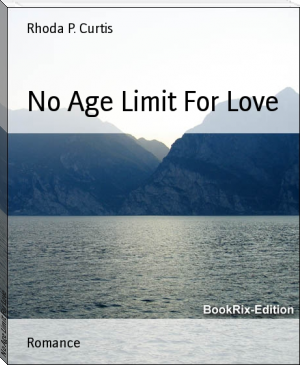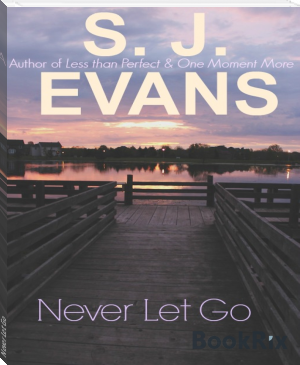No Age Limit For Love - Rhoda P. Curtis (best short novels of all time txt) 📗

- Author: Rhoda P. Curtis
Book online «No Age Limit For Love - Rhoda P. Curtis (best short novels of all time txt) 📗». Author Rhoda P. Curtis
NO AGE LIMIT FOR LOVE
When I was seventy-two, I met the love of my life, Peter Meilleur, a Frenchman, who was eighty-five. We had eight glorious years together before he died of a stroke in 1998.
At a conference in San Francisco in 1990, I met Peter’s son, Raoul again. Raoul was also a participant in the conference, and we had connected over the years. This time, when we met again, Raoul said, “Rhoda, you look marvelous. What’s going on in your life?”
I replied, “Well, I’ve just had my seventy-second birthday, and I’m feeling restless. I’d like to find a traveling companion, preferably male.”
Raoul said, “You should meet my father. He’s eighty-five and he likes to travel. My mother died about eight years ago, and he’s living alone.”
“Ah,” I said, “Is he committed to anyone?” I had had it up to my eyebrows with men who were either married or connected to someone and who wanted a fling ‘on the side.’
“Well,” said Raoul, “There’s a woman in Paris who lives on a houseboat in the Seine, and he goes over to visit her from time to time. But they fight all the time.”
My reaction to that bit of information led me to give Raoul my card. I figured Paris was far enough away. “Ask him to call me, if he’s interested,” I said. “I have an answering machine.”
Raoul”s response was, “Don’t hold your breath. Peter doesn’t like answering machines.”
Raoul couldn’t have been more wrong. When I got back to my apartment in Berkeley, I found Peter’s message:
"This is Peter Meilleur. My son gave me your telephone number and suggested I call you. I live in Santa Rosa. My number is 707-527-7792. I like sevens."
I called him, and we set up our meeting. "How will I know you?" I asked.
"I have gray hair, and I wear my glasses around my neck. I'll be carrying a letter-size portfolio under my arm."
"Okay," I said, "I have gray hair and I wear my glasses on my face. I'll be wearing a bright embroidered jacket from Thailand. I'll be in Novato in the morning, doing an observation of a teacher. How about twelve-thirty at the Marin County Office Building?"
I didn’t know when I pulled into the County Office Building complex promptly at twelve-thirty that I was beginning one of the most companionable, sexually satisfying eight years of my life.
Standing on the steps of the Frank Lloyd Wright building, I saw a medium-sized, gray-haired man wearing a cashmere pullover, glasses hanging on a string around his neck, a letter-size portfolio under his arm, and an expectant look on his face. He was handsome, and his mouth turned up at the corners.
We went into the complex, joined the cafeteria line, and sat down at a quiet table for lunch. Peter began to talk. He opened his briefcase, pulled out some photographs, and began to tell me the story of his life. I was so fascinated that I didn't interrupt him, except for a few questions, for the next two and a half hours. It was easy to slip into a listening mode, a style I had developed over years of doing oral interviews and teaching. Peter had brought photographs of his family and himself, and told me the whole story of his family's emigration to the United States in 1908, three years after his birth.
I realized that he was establishing who he was, in the French manner, letting me know his background, clarifying his status and his frames of reference.
"I have four nationalities," he said, his blue eyes twinkling. "I was born in Switzerland. Times were bad in Meribel, France, where my parents came from, and my father, who was a baker, moved my mother and my three brothers to a small town in Switzerland, just across the border from France. That's why I was named Peter Ludwig instead of Pierre Louis! So I have both French and Swiss citizenship. Then we came to the United States--to Plainsville, Kansas, from the Swiss Alps, when I was three years old. We lived in Plainsville for a few years, but not long enough for my parents to become citizens. Plainsville burned down and we moved to Vancouver, Canada, where my parents, and therefore I and my brothers, acquired Canadian citizenship!"
He paused, and I jumped in with a question. "You said you had four nationalities, and you've accounted for three of them. Did you stay in Vancouver?"
"Ah," said Peter. "That's the next part of the story. My father died at fifty, and all my brothers died by the age of forty. I didn’t expect to live this long. I guess I inherited my mother's genes." He stopped, took a sip of his coffee, and continued. "My mother and I moved to Seattle, and I went to work for an advertising agency. The year was 1942, and I didn’t think I would get drafted, since I was thirty-seven years old, but I remember thinking, what if I do get drafted? I remember standing on a street corner in Seattle. To my left, down the block, was the recruiting office for the Canadian army; to my right, was the office for the United States Army. I knew that if I went to the right, I would get instant citizenship in the United States, and I thought, that’s a good idea, so I went to the right. It was a good decision; it changed my life."
I looked at my watch. It was almost three o'clock, and I knew I had to get on the freeway before four, or I would hit bumper-to-bumper traffic across the bridge to Berkeley. Peter saw me looking at my watch, and immediately leaped to his feet.
"Would you like to come to dinner tonight? I have a two-bedroom condominium in Santa Rosa, and each bedroom has its own separate bathroom. You could stay overnight.” He was quite sincere, and I'm sure he wasn't aware of how his invitation sounded.
I laughed. "Sorry, Peter," I said. "I have to teach tonight. Maybe some weekend."
As we walked out to the parking lot, he asked, "Do you play chess?"
"Yes," I answered, "but not very well."
He grinned, gave me a quick kiss on the cheek, and trotted off to his car. He almost kicked his heels in the air. I looked back at him and felt delight and warmth surge over me. It was odd. On one hand, I was pessimistic about meeting anyone exciting at my age, and on the other hand, I was still hopeful that companionship was possible.
I went to Santa Rosa the following weekend, and on the drive up, kept trying to smother my excited anticipation.
As I walked into Peter's condominium, the first thing I noticed was an antique clock spread out in pieces on the coffee table in his combination dining and living room.
"I'm a collector of clocks," Peter said, "and I like to take them apart and repair them."
That was the understatement of the week. There were clocks all over the place-- not just three-hundred-year-old chiming, pendulum clocks, but marble and onyx mantel clocks. Every kind of clock except cuckoo clocks. Peter had no use for cuckoo clocks…they were toys, he said.
There were also many very good paintings on the walls, and I discovered they were all Peter's watercolors. There were Mexican masks and pre-Columbian artifacts. As we walked around the room, Peter told me about the watercolors and the paintings. He was self-effacing about the paintings. He said they were "just sketches." They didn't look like sketches to me; they were full of movement and life.
He showed me the bedrooms and the bathrooms. There were paintings, sculpture, books, everywhere. I was entranced as one aspect of Peter's life after another unfolded; each one connecting to a period of my own. I too had spent a lot of time in Mexico and collected fabric as well as pottery; had made jewelry; had done some sketching; and I loved to read. I found echoes of my own taste in some of Peter's books, and felt more and more drawn to him.
Peter invited me to explore his garage, which was really his workroom. It was full of tools, two and maybe three of everything: hammers, files, pliers, clock parts, an acetylene tank, and even two bicycles hanging from the ceiling. There was a place for everything, and everything was in it.
I realized that Peter was really a serious collector. He loved garage sales and thrift stores, and he loved to fix things. He couldn’t resist a bargain. We came back to his living room combination dining room, and I collapsed on his leather couch.
"Just relax," he said. "I've already prepared dinner. Chicken livers in wine, with rice and broccoli. I don't drink, but I like to use wine in cooking. How does that sound?"
"It sounds fantastic! Do I have to do anything?" I couldn't believe my good luck. An intelligent, artistic man, who also liked to cook!
"No, just relax," he said. "Dinner will be ready in about ten minutes."
Something strange was happening to my insides. A man who didn't drink, who liked to cook, who had an organized, positive outlook on life, who was not married, who seemed to be going out of his way to be hospitable--could this really be happening to me? I accepted the glass of wine he offered me, being careful to avoid the clock parts on the table in front of me.
Dinner was delicious, and we played Scrabble after dinner on the dining room table. I slept well in the guest bedroom, and in the morning, after breakfast, we decided to go to Bodega Bay for the art show celebrating Earth Day.
We examined the art pieces critically, and in the craft section, I spotted a handmade walnut rocker, so beautifully shaped and crafted that it looked like a human figure. I sat in it and sighed. It fit the curvature of my spine as if it had been made for me. I inquired about the price. It was thirty-five-hundred dollars. I swallowed, smiled, stroked the lovely curved arms of the rocker and turned away, regretfully.
I couldn't get that rocker out of my mind. The next morning, after breakfast, I mentioned to Peter how I yearned for that rocker.
"You should buy it," he said.
I protested that I couldn't, that I had just put a down payment on a





Comments (0)